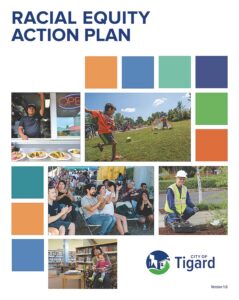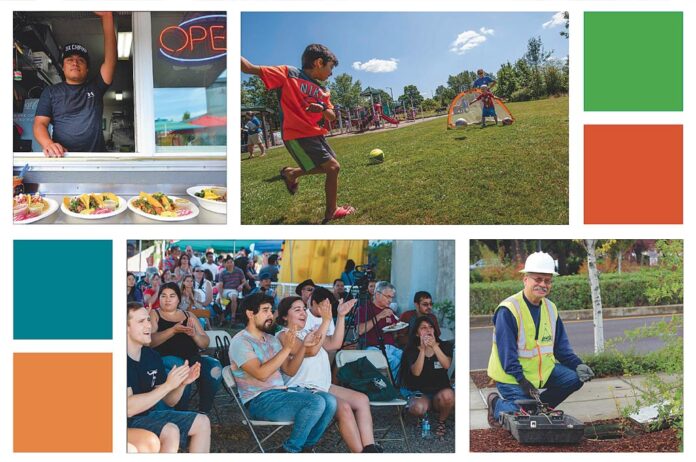In a move designed to “embrace the inherent value of every person,” the City Council voted unanimously to adopt a Racial Equity Action Plan and a separate Equity Commitment Declaration at two recent city council meetings.

“We view both of these documents very much as living documents,” City Manager Steve Rymer told members of the council. “We want to start with a point in time, but we know that things change, we learn more, and new ideas come our way.”
The twin documents, drafted by a Diversity Inclusion Equity Board headed by City of Tigard DEIB Manager Kurt Jun, codify one of the city’s guiding visions and its stated goal of creating a walkable, inclusive, equitable community.
The 57-page plan, which includes both a brief history of Tigard beginning before colonization with the indigenous peoples who lived here and a current breakdown of the city’s demographics, aims to counter systemic racism and remove barriers to employment for under-represented populations.
“Racial equity means to close the gaps so that race does not predict one’s success while also improving outcomes for all,” the document reads.
Its three-pronged approach breaks the work into categories: cultivate inclusive culture; develop and utilize shared tools and resources like city-wide trainings; and a forthcoming Equity Tool Kit, with a bias towards action and continuous improvements.
On a practical level, it breaks down to education, training, developing analytics to identify key performance indicators for equity and the development of a diverse workforce plan.

“One of the most important items I have here in terms of the new initiatives is an equity tool kit that will standardize a way in which we can operationalize equities to ensure that there was some lens and practices of standardization that has been applied,” Jun said. “That will be a long-range goal of implementation.”
The team reviewed and drew from similar tool kits from larger cities like Portland and Seattle for this first draft. Those source documents are included in the Plan’s appendixes.
“(The toolkit) will guide us in critically assessing the effects of our decision-making on impacted communities in order to create solutions that address disparities and share a more equitable future for Tigard,” Jun said.
As Rymer said, and Jun reiterated, it’s meant to evolve continually toward greater inclusivity and equity.
“This plan is not to accuse our city. It is to ensure that our city is equitable in our practices, procedures, programs, as well as finances,” Jun said.
He’s been invited to present cross-cultural training and diversity workshops to the public works, police, and other departments.
“Part of the work is meeting people where they are to bring them along,” he said.
The city is also making updates to the hiring process.
Of its 369 current full and part-time employees, 82 are “diverse,” a number that’s doubled in less than three years.
“The commitment to diversity is evident in recent hiring,” city Human Resources Director Wendi Warner said.
She unveiled the new “You Belong With Team Tigard” logo that appears on recruitment and application materials with a graphic featuring five circles in different shades of greens and blues meant to represent a spectrum of skin tones.
“We want to attract people who have those values and hold those values dear,” Warner said. “We want people to know that’s something that we represent here at the city.”
Applications have also been updated to include non-binary and ungendered options along with male and female, and acronyms have been swapped for fully spelled-out department names to eliminate confusion.
The city is also tracking applications over time to pinpoint where people might be falling out of the application process, information that will be used as the program evolves.
“We have to always begin with the context of why, because we all have very different perspectives around this work,” Jun said. “Many of my colleagues in the city recognize the clear moral imperative of this work.”
Councilors voted unanimously in favor of both the Declaration and the Plan, with an enthusiastic thumbs-up advisory vote from Youth Councilor Magi Vogel.
“These words are fundamental to what I believe as a human being and what I’ve experienced as a human being,” Mayor Heidi Lueb said of the declaration. “Just and fair inclusion where all can patriciate, prosper, and reach their full potential. Think about what our community could look like if everybody reached their full potential.”
This City Council is the most diverse in Tigard’s history.
“Children need to see themselves in leaders,” Councilor Maureen Wolf said. “It matters deeply to me.”
Lueb has seen that visible representation empowers larger numbers of traditionally marginalized people to take part in the conversation.
“It’s been incredible to watch community members who feel as though they’re being represented, and that they’re seen, and they’re heard, and the diversity that has been participating far beyond what I saw four years ago,” she said.






















